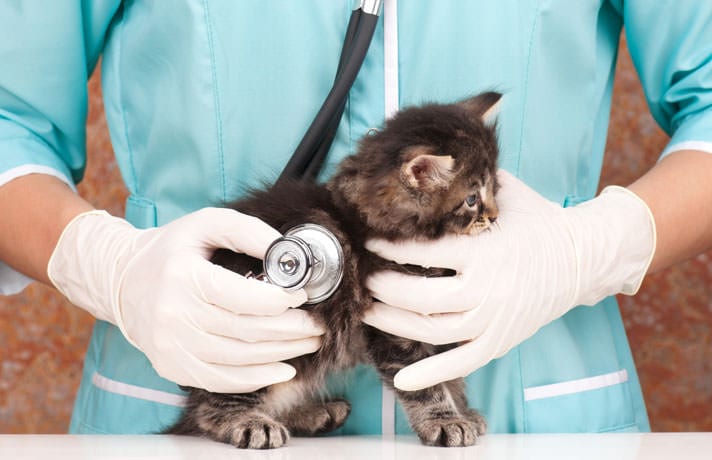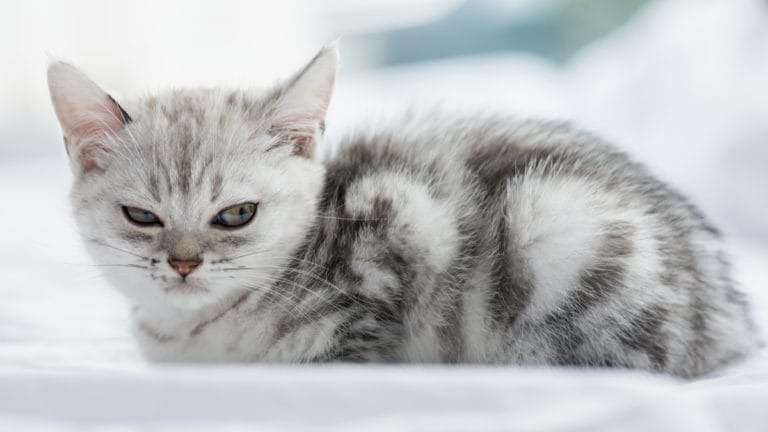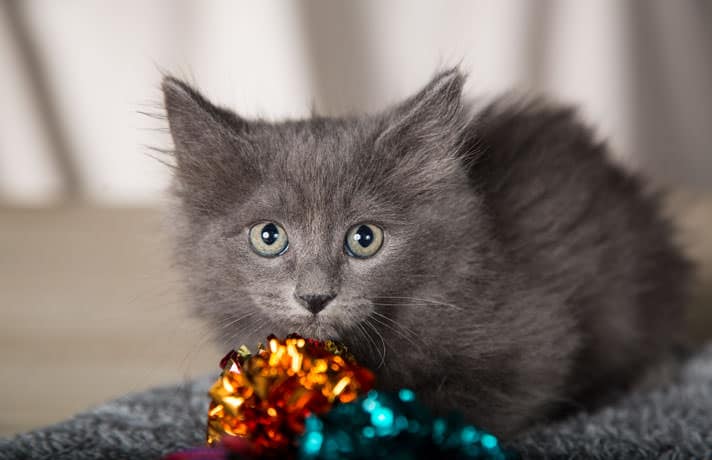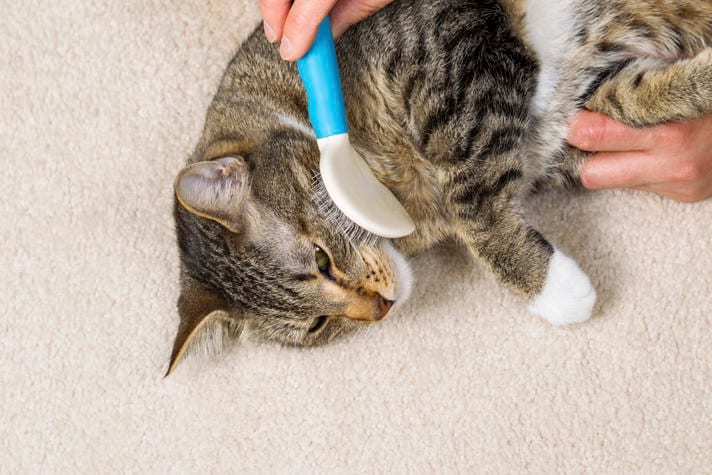Whether you obtained your kitten as a newborn, bottle-fed bundle of joy or as a weaned youngster, a distended abdomen or bloating can signal danger and should be addressed immediately. Knowing the potential causes of bloating can be helpful in preventing and treating it, in most cases. Newborns can be afflicted with congenital abnormalities of the gastrointestinal tract, leading to food going in but feces not coming out. The wrong type, amount or quality of food can potentially cause a kitten to develop a pot-bellied appearance or even diarrhea. Bacterial overgrowth in the intestinal tract or the presence of some viruses can lead to serious illness or even death. Whatever the cause, a bloated kitten is going to be uncomfortable and possibly in pain.
Born This Way: Genetic Causes of Kitten Bloat
Congenital disorders are abnormalities that are present at the time of birth. Some kittens can have congenital malformations that are not visible on the outside. An afflicted kitten can appear normal at birth, but as days go on, become bloated and may experience poor suckling and development.
A commonly seen malformation is called atresia ani. While still in the womb, a fetus with this condition does not develop an anal opening for feces to exit the body. Kittens born with a disruption or narrowing anywhere in the gastrointestinal tract may experience bloating. For human babies born with this condition, surgery is performed to correct it. Sadly, in kittens and puppies this type of surgery is not usually a viable option. If the stricture, or smaller-than-normal passage, within the stomach or intestine is still large enough for milk to pass through, a problem may not emerge until weaning, when solid foods are introduced. A veterinarian can perform a barium radiograph study to potentially identify this kind of congenital disorder.
Congenital defects affecting the kidneys may also cause a distended abdomen. Hydronephrosis (fluid collection around the kidney) or polycystic kidneys may cause organ enlargement and the abdomen to appear distended. Routine veterinary examinations of kittens are often able to detect these conditions, if the abnormal organ size is significant enough to be felt with abdominal palpation.
Eating Makes Me Sick: Food That Can Cause Bloat
A mother cat’s milk has the ideal combination of proteins, fats and carbohydrates and is rarely the cause of diarrhea or bloating in nursing kittens. Certain kinds of infection, however, can compromise mama cat’s optimal milk makeup and possibly make it dangerous for her kittens. Infections of the mammary glands or uterus can produce toxic milk syndrome, which causes bloating, green diarrhea, crying and a red, swollen rectum.
Milk replacement formulas, particularly powdered forms, may be a source of woes from constipation or diarrhea if not mixed in the correct proportions with water. A distended abdomen caused by constipation may also result if bottle-fed kittens do not receive proper anogenital stimulation to produce feces and urine after feeding. If you are raising orphaned kittens, educate yourself on the fine points of raising them to help eliminate such potential pitfalls.
Once kittens are weaned, owners fall into the oh-so-confusing dilemma of which food to feed. Cats have lower levels of certain enzymes needed for the digestion of carbohydrates. Because of this, certain individuals may be more intolerant of the carbohydrates present in some diets, especially dry kitten or cat foods. Carbohydrate intolerance can present as excessive gas and/or loose malodorous stools. Youngsters may be particularly at risk due to their immature and sensitive gastrointestinal tracts. Using a canned food can help reduce the amount of carbohydrates present and, in general, are easier for both kittens and adults to digest. If feeding canned food is not possible, choosing a high-protein, low-carbohydrate kibble may help improve stool consistency and reduce bloating.
Kittens need frequent access to fresh food, whether they are nursing or weaned. Too much food, however, can overload the gastrointestinal tract, deplete digestive enzymes and lead to bloating and diarrhea. Feeding amounts and frequency depends on the age and weight of the kitten. Bottle-fed kittens require smaller but more frequent volumes about every two to four hours, with the amount of milk fed depending on their weight. Weaned kittens can be offered food three to five times a day as they adjust to solid foods, be it dry kibble or wet, canned food. Note that compared to canned food, dry food takes longer to break down and it expands as gastric fluids are absorbed in the stomach. As a result, a kitten is less likely to become bloated from overeating canned food than dry kibble.
Bacteria, Viruses and Parasites That Cause Kitten Bloating
The intestines of kittens are sterile at birth but begin to colonize with bacteria commonly found in their mother’s mouth, intestines and the external environment. It can take from a few days to as long as a week for the baby’s intestines to fully colonize with these commensal bacteria. This normal and beneficial bacterial flora can help reduce diarrhea and gas, and actually aid in the development of a healthy immune system. Kittens orphaned very early after birth may not have had the good fortune to benefit from being exposed to their mother long enough to sufficiently populate their intestinal tracts with normal gut flora. As a consequence, these kittens may suffer health issues.
While commensal bacterial colonies are normally beneficial and important to health, under certain circumstances they can be a source of trouble. Inflammatory conditions affecting the intestine can cause a breach in the security of the intestinal wall, enabling intestinal bacteria to migrate into the bloodstream, leading to infection or sepsis. At this point, immediate, aggressive treatment with antibiotics and supportive care is needed to prevent death. Additionally, spoiled replacement milk formulas or abnormal mother’s milk can cause bacterial overgrowth, resulting in diarrhea and bloating in nursing kittens.
Cat viral infections, such as panleukopenia and enteric corona viral diarrhea, can cause gastrointestinal disturbances in kittens. The relatively harmless enteric coronavirus does have an evil twin strain that mutates and causes a deadly disease called feline infectious peritonitis, commonly referred to as FIP. Two clinical presentations exist for this disease, the “wet” and the “dry” form. Kittens affected by the “wet,” or effusive, form develop a distended, fluid-filled abdomen and, unfortunately, die within a short period of time. The “dry,” or non-effusive, form does not cause abdominal distention from fluid, but affects the internal organs with inflammation that can cause mild organ enlargement and ultimately death.
Intestinal parasites can cause a significant infection or burden in kittens as young as 2 to 4 weeks of age. Large roundworms produce larvae that can be transmitted from the mother cat through the placenta to the fetus. Hookworms also produce a larval stage that can migrate into mammary tissue and are then ingested via the mother’s milk after birth. At the adult stages, these intestinal worms are large and can cause bloating, diarrhea, weight loss, a generally underdeveloped appearance and even anemia. It is generally recommended to have kittens dewormed when they are as young as 2 to 3 weeks old, with additional treatments until they reach 12 weeks of age.
Protozoal parasites are not worms, rather, protozoa are microscopic organisms that invade the intestinal wall. Giardia (gee-AR-dee-ah) and coccidia (kok-SIH-dee-ah) are common species capable of causing significant irritation to the intestinal tract. Kittens may experience vomiting, diarrhea and bloating, though in some cases they may appear perfectly normal! Different medications are used to treat intestinal worms versus protozoan infections. Kittens should have a microscopic examination of their stools performed by a veterinarian to look for these intestinal invaders.
Having a new kitten in your life is an exciting time! Watching your baby grow from an awkward, rambunctious juvenile into a glorious adult can be fun and rewarding. Keeping your kitten happy and healthy is your obligation and privilege. Recognizing the signs of distress and disease can help you act quickly and appropriately to maintain your kitten’s life with love, health and happiness.
By: Dr. Heidi Pavia-Watkins
Featured Image: 2002lubava1981/iStock/Thinkstock
Share:









